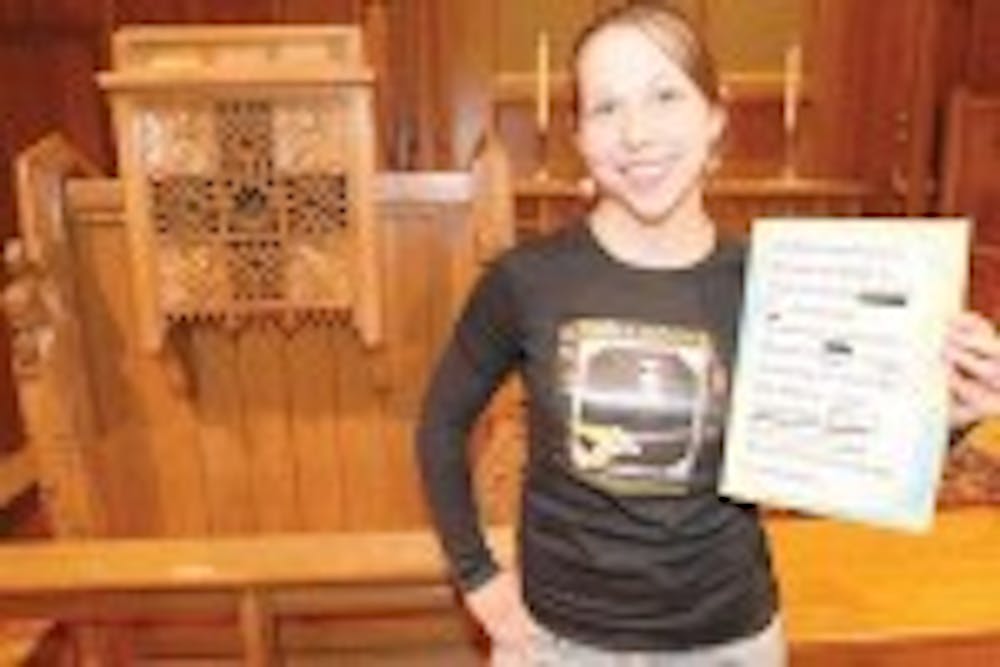In a bright wood-bound chapel room on a rainy Saturday night, a poetic atmosphere was created in honor of poet Emily Dickinson almost 130 years after her death.
Literary scholars, readers and students gathered at the Westminster Presbyterian Church on Delaware Avenue for a 14-hour Emily Dickinson marathon reading.
This was the second-annual reading of Dickinson's poems in Buffalo. The selected readings from R.W. Franklin's The Poems of Emily Dickinson and food and refreshments were served throughout the day for the attendees' enjoyment.
Kate Dunning, a Ph.D. candidate at Case Western University, did a project on Emily Dickinson fan fiction.
"The stories are simple but sweet, and they tend to work in Dickinson's poems in a really creative way," Dunning said.
When it was Dunning's turn to read a poem, she recited the poem featured on her homemade tie-dye box, fitted with rotating blocks of text and select words. The rotating text is an allusion to Dickinson's habit of using variants in her writing, which result in the use of different, effective words instead of repeating one.
"The idea is that it mimics the creative act of writing poetry," Dunning said. "It's [there] to remind you that language isn't static. It's a dynamic process."
Across the room, Jonathon Welch, the owner of Talking Leaves Books, had a collection of biographies, academic texts and selected works of Emily Dickinson for sale.
Welch believes that although Dickinson was against being in the public eye, readers are still lucky enough to learn about her personal and written legacy during events such as the 14-hour marathon.
"We who pay attention to the world of literature think all that information is extremely useful and wonderful and compelling and insightful, but is it necessary?" Welch said. "Poetry and fiction both, I think, are ultimately private - private on the part of the writer and private on the part of the reader and listener."
Cristanne Miller, a literature professor and chair of the Department of English at UB, organized the marathon reading and was present for the full 14-hour day. She is a scholar of modernist American poetry, but Dickinson is one of the main poets on which she focuses her work.
"Dickinson is a particularly good poet to do this kind of thing for," Miller said. "These marathons are done with some frequency with Dickinson's poems across the country, especially in Amherst, Mass., where she grew up."
Miller was elated by the success of the reading and the Buffalo literary scene's collective appreciation of the poet's works.
"The poems are very short, so it's easy for each person to read a whole poem, whereas if you were doing a marathon reading of Walt Whitman, his poems are extremely long," Miller said. "You would have to figure out some other way to divide how each person would read."
When asked how she thought Dickinson would react to the close and personal gathering of readers, students and scholars, Miller explained it was clear Dickinson didn't want attention from publishing during her lifetime.
"I think that she did not want herself to be involved in the marketing of her poems, but it seems to me by the way that she saved her poems she very clearly wanted them to be circulated after her death," Miller said.
Among a display of biographies and books of the poet's works, a table was set up with a collection of children's books, articles and a homemade creation that replicated the creative process of one of Emily's untitled poems.
As the marathon came to a conclusion, there was a feeling of camaraderie and accomplishment amongst all who were in attendance. Laughter and jovial sincerity filled the room over the music from the corner as glasses of wine were filled and emptied.
Email: arts@ubspectrum.com





